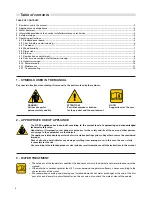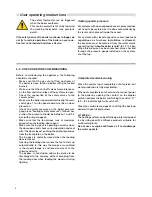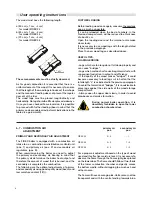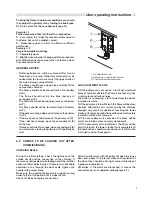
7
User operating instructions
6.3 - FIREWOOD
Wood is formed mainly by cellulose and
lignite. It also contains other substances, such
as resin (fi r - pine), tannin (oak - chestnut) and,
obviously, a large quantity of water.
Good quality woods are oak, ash, beech,
maple and fruit trees, except cherry; medium
quality wood is: chestnut and birch; suffi cient
quality wood: lime tree, poplar and willow.
Resinous trees are, normally, second-rate quality fuels.
Wood is therefore an extremely heterogeneous fuel,
due to different essences (beech, oak, fruit, resinous),
different moisture content, and due to different shapes
and dimensions.
Boiler operation will inevitably be effected by all these
factors. Especially by the log dimensions, the moisture
content and the way wood is loaded in the boiler.
6.4 - WOOD MOISTURE
The calorifi c value of the different types of wood
depends on their moisture content, as illustrated
in the table. Boiler output and autonomy will
diminish as the moisture increases. The table
provides the power reduction factor based on
the humidity of the wood being used. The heat
output of the FIREX boiler is calculated for
wood with a 15% moisture content.
As an example, wood which has been dried for
2 years in a sheltered area has a 25% moisture
content.
Example:
humidity of the wood being used = 30%
output = nominal output x 0.79
Correction factors for wood humidity
% OF
HUMIDITY
CALORIFIC
VALUE
kcal/kg
CORRECTION
FACTOR
15
20
25
30
35
40
45
50
3,490
3,250
3,010
2,780
2,540
2,300
2,060
1,820
1
0.93
0.86
0.79
0.72
0.65
0.59
0.52
6.5 - FIREWOOD DIMENSIONS
The dimensions, together with the moisture
content, contribute to determine the boiler’s
output. Small pieces (with a length, however,
conforming to indications indicated hereby)
are more easily fl ammable and therefore
have the tendency to increase the boiler’s
output and therefore to reduce its autonomy.
Moreover, they fall with greater facility, in
the lower chamber, reducing the risk of
the formation of “bridges”. The so-called
“bridge” is an empty space in the fi rewood storage
compartment, where unburnt wood logs remain. In
this case the bed of embers is not fed with continuity
and the refractory burner’s slot is uncovered. In these
conditions, preferential air ducts are created with a very
small fl ame due to an excess of air.
The FIREX boiler must be fed with natural wood logs
at the length indicated in paragraph 6.6. The logs must
normally be round (Ø approximately 10 cm).
6.6 - START-UP
Make sure that the controls referred to in
point 6.2 have been performed.
Close the bottom door and power the
control board (for the functioning mode,
see point 6.1).
Open the top loading door and place small
pieces of dry wood crosswise on the main stone, above
the central slot.
Use highly fl ammable material on the wood, avoiding
large and square logs.
Light the wood using thin sheets of paper (newspaper
or the likes).
The fi rst ignition of the new boiler could be diffi cult due
to moist refractory cement casting.
Accordingly, we advise opening the primary air well and
lowering the secondary air.
Approach the top door and turn on the fan.
Wait a few minutes for the fi re to catch and produce
embers (5 - 10 minutes approximately).
After a few minutes, if looking through the fl ame sight
glass of lower door you see that the fl ame inversion is
beginning, add other larger logs.
Close the top door.






























